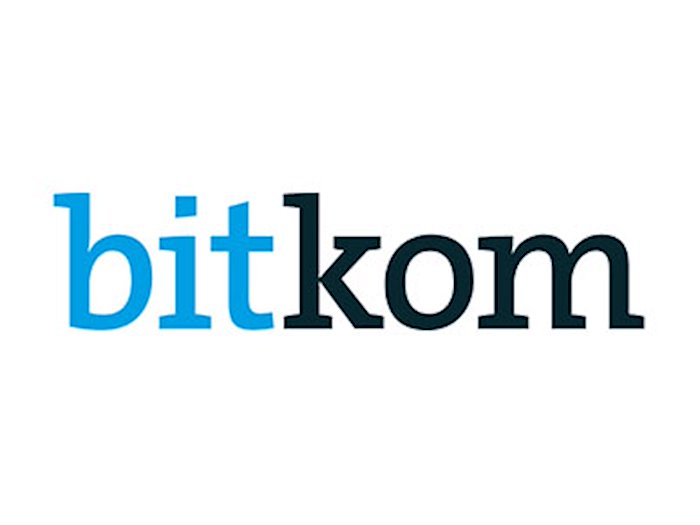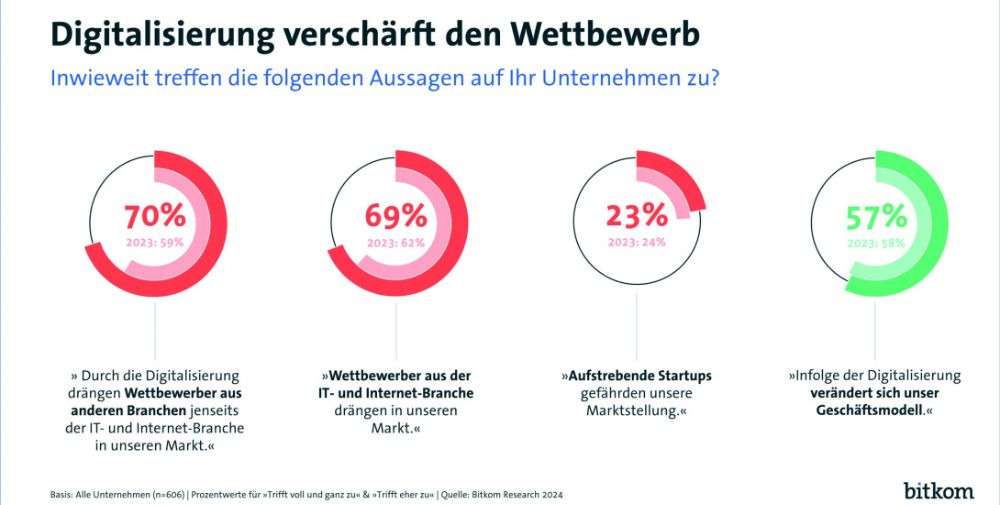
At the same time, 9 out of 10 companies (91%) have a digital strategy, 9 out of 10 (93%) are currently implementing digital projects in at least some areas and more than one in three (37%) even see themselves as pioneers in digitalization. “We are seeing increased efforts to drive digitalization forward in many companies. Too often, however, they stop at discussions and do not yet move on to implementation. Successful digitalization requires knowledge and tools,” says Bitkom President Dr Ralf Wintergerst. “Every single company now needs to make an effort to move from planning to implementation when it comes to digitalization. Analog business models are not the answer to intensifying competition. It is up to management to seize the opportunities offered by digitalization.”
The vast majority of companies complain that external conditions are slowing down their digitalization. These include increased energy costs (98%), a lack of growth momentum (97%), the disruption of supply chains (97%) as well as inflation and high interest rates (96% each). The Russian war of aggression against Ukraine is having a negative impact on digitalization in 60% of companies. However, the policies of the German government (97%) and their own state government (84%) are also slowing down digitalization in the majority of companies.
Every fifth company is increasing digital investments, every second is keeping them constant
When it comes to investments in digitalization, the picture is split. Seven percent want to invest significantly more in digitalization than in 2023 and 14 percent slightly more. And around half (48%) want to continue investing at the same level. However, 18% plan to spend less on digitalization and 12% even significantly less. “In view of the difficult economic situation and the numerous regulatory interventions, predominantly stable or even increasing digital investments are a positive signal on balance,” says Wintergerst.
Digital technologies are seen as very important
Practically all companies (98%) see data analysis as very important for the competitiveness of the German economy, but only 37% of companies are already using big data, while 48% are discussing or planning to use it. 93% consider the Internet of Things (IoT) to be very important, but only 30% are using it, while 54% are in the discussion or planning phase. In the case of 5G, 92% see it as very important, 29% use the technology and 47% are discussing or planning to use it. The picture is similar for robotics (88% major importance, 36% users, 38% planners and discussers) and autonomous vehicles (69% major importance, 18% users, 29% planners and discussers). The discrepancy between general assessment and implementation in the company is smallest for virtual and augmented reality: Here, 60 percent of companies see great importance for competitiveness, and just as many use the technology (29 percent) or are planning or discussing its use (31 percent).
Artificial intelligence: one in three companies is discussing its use
The currently much-discussed future technology of artificial intelligence is of great importance for future competitiveness for 82 percent of companies, but just 13 percent are using it, while 33 percent are planning it or are still discussing it. Blockchain technology is even less widespread in German companies, with 70 percent attributing great importance to it, but only 3 percent use it and 23 percent are planning or discussing it. Although 44% consider the metaverse to be important, only 2% use the technology or are planning or discussing its use. And 51% consider quantum computers to be very important, but practically no company uses the technology or is already in the planning or discussion phase. “As a country that is poor in raw materials and is also facing a serious demographic change, we need to focus more on digital technologies than in the past. Artificial intelligence in particular offers huge opportunities and is reshuffling the cards in almost all sectors,” says Wintergerst. “At the same time, the barriers to entry for the use of technology are lower than ever before. Every company should try to gain its own experience with new technologies. The aim must be to identify and exploit digitalization opportunities at an early stage.”
Digital business models: many companies are still struggling
Those who fail to make progress with digitalization could face major difficulties in the future. This is because a clear majority of 57% of companies are changing their business model as a result of digitalization. However, almost half of companies find it difficult to develop digital products and services: 24% find it rather difficult and the same number find it very difficult. Conversely, only 16% say that development is fairly easy for them and just 4% say that it is very easy. Wintergerst: “Digitalization is not magic and the barriers to entry into the digital economy have probably never been as low as they are today. The first step is often the hardest. Once you have managed to get started, a new world opens up.”
Revenues from digital products or services will play a role for many companies in the future. 5 percent expect to generate at least half of their turnover with them in five years’ time. Around a third (32 percent) expect a share of 30 to under 50 percent and around a quarter (26 percent) expect 10 to under 30 percent. For 13 percent, it will be less than 10 percent, and only 1 percent predict that they will have no digital sales at all in five years. 22 percent are unable or unwilling to provide any information.
Almost all companies have a digital strategy
The vast majority of companies are now taking a strategic approach to digitalization. Only 7 percent still have no strategy for managing digital change. Last year, this figure was 11%, in 2019 it was 26%. Around one in three companies (31%) have now developed a company-wide digital strategy, while 60% have one in at least individual areas of the company. “Companies are strategically positioning themselves for digitalization, developing strategies and concepts and also setting up internal control units. However, there is a lack of the necessary investment,” says Wintergerst.
The vast majority of companies are currently working on digitalization projects in various areas of the company. At the top of the list are customer service (44% of companies) and logistics (43%). This is followed by sales (37%) and accounting (36%). Around one in four companies has digital projects in production (27%), marketing (24%) or product development (23%). One in five (20 percent) has such a project in controlling, only 17 percent in human resources. In only 7 percent of companies is digitalization not an issue in any of these areas.
Digitalization projects are often driven by the company’s top management. In more than half of companies (54 percent), the board of directors or management are driving digitalization projects forward. This is closely followed by the IT department (47%). In 10 per cent of companies, responsibility lies with the Chief Digital Officer (CDO) or a “Head of Digitalization”, in 7 per cent with those responsible for corporate development. But in one in nine companies (11%), digitalization comes from the grassroots. There, individual employees are the drivers of digitalization.
Data protection, shortage of skilled workers and lack of time slow down digitalization
The hurdles that companies face when it comes to digitalization have grown recently. Data protection requirements (83%, 2023: 77%), the lack of skilled workers (78%, 2023: 64%) and a lack of time in day-to-day business (69%, 2023: 54%) are cited most frequently. Just over half of companies also complain about a lack of financial resources (59%, 2023: 54%) and technical security requirements (52%, 2023: 54%). In addition, many companies cite lengthy decision-making processes within their own company (41%), a lack of availability of marketable solutions (40%), a lack of willingness to take risks within the company (35%), a lack of exchange with other companies (29%), a lack of knowledge about best practice (23%) and a lack of willingness among the workforce (14%) as obstacles to digitalization. In contrast, uncertainty about the economic benefits (6 percent) is hardly an obstacle to digitalization. “A lack of time or financial resources should not be a reason for sluggish digitalization – it’s about the future viability of the company,” says Wintergerst. “But politicians should also do their homework. We’ve been talking about the skills shortage for decades, especially in IT, without anything having improved – on the contrary. We have too few skilled workers, and we have too much regulation.”
Digitalization: large companies rely more on cooperation than small ones
One way for many companies to drive digitalization forward is through cooperation. Almost half (47 percent) of companies use them, although there are differences depending on the size of the company. For example, 61% of companies with 500 or more employees and 64% of SMEs with 50 to 499 employees have such collaborations, but only 45% of companies with 20 to 49 employees. The experiences are predominantly positive: three quarters (75 percent) of companies involved in collaborations generally see their expectations fulfilled. The most common obstacle for companies that do not use cooperation is not enough money (70 percent). However, a lack of time (66 percent) and a lack of suitable projects (49 percent) are also widespread. 69 percent of companies do not know who they can turn to. And 23 percent have sought cooperation, but the partners were not interested. Wintergerst: “Those who cooperate make progress in digitalization. We need to do even more to support small and medium-sized companies in particular in finding partners to develop digital business models and use digital technologies.”
– – – – – –
Further links
👉 www.bitkom.org
Graphic: Bitkom




